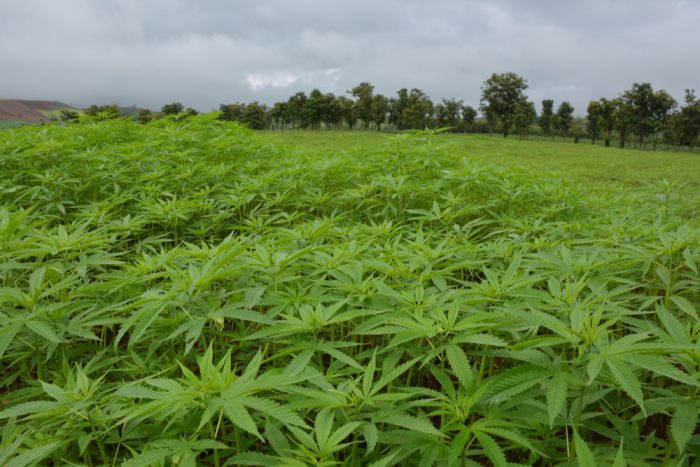Rangsit study uses cannabis extract with THC and CBN to treat lung cancer in the animal model.
Cannabis extract has quickly become one of the most popular cannabis treatment methods. It has a variety of uses from dabbing and oils, to topicals and vaping, and the list goes on. As a result, new breakthroughs are happening all the time – most recently in lung cancer treatment.
One of the leading cause of cancer deaths is lung cancer. Lung cancer, both small cell lung cancer (SCLC) and non-small cell lung cancer (NSCLC), are the second most common types of cancer for both men and women. Men have a 1 in 15 chance of developing lung cancer, while women have a 1 in 17 chance. The 5-year relative survival rate for this cancer is 30 percent.
It’s not hard to see why research into new lung cancer treatments is crucial. You likely know someone who has struggled with lung cancer. It’s a vicious disease and one that can have an impact on a person’s life long after cancer has gone into remission. And sadly, current therapies are not always successful.

Via Asia Exchange; Rangsit University outside of Bangkok
Researchers at the newly founded Medical Cannabis Research Institute of the College of Pharmacy at Rangsit University (Bangkok), are hopeful. The team announced their findings during the Institute’s opening ceremony in April, 2019: Cannabis extract, containing both tetrahydrocannabinol (THC) and cannabinol (CBN), may hold the answer to an effective lung cancer therapy.
Thailand Leading the Way for Cannabis Research
The Rangsit study explored how a cannabis extract of THC and CBN, when delivered intravenously to lab rats, influenced lung cancer mass. To their astonishment, the cannabis extract stopped the growth of lung cancer cells. Their conclusions build on a long history of cannabis for lung cancer research.
In the words of Assistant Professor Surang Leelawat, director of the Medical Cannabis Research Institute: “Even though it is too early to claim that cannabis can cure cancer, this promising research result will be developed further through a phase of clinical trials in humans. We hope that we will find an effective treatment for lung cancer in the near future.”

Via Bangkok Post; Assistant Professor Surang Leelawat in her lab
Rapidly Shifting Opinions on Cannabis
This study’s conclusions are so promising that it inspired the formation of a new Thai research center at Rangsit University. Only a decade ago, Thailand was a country notorious for its tough stance on cannabis, and now it is leading the way with research into the plant’s therapeutic properties. It’s amazing what a little scientific study can do to public and political opinion.
Medicinal cannabis is gaining momentum in Thailand. In late 2018, the government approved medicinal cannabis legislation. Now, they are well underway with funding research into cannabis extracts. At Rangsit University, they have already developed a new approach to extraction, capable of pulling THC, CBN, and CBD from medical grade plant material. They have also produced four unique cannabis-based medicines, including cannabis tablets, a traditional Thai Phrasa-Kancha preparation, cannabis oil, and a CBN oral-mucosal spray. All these products are expected to be commercially available in the coming months.
Soon, the institute will be harvesting its first approved crop of medical cannabis. This closed system cannabis farm will enable the research team to become one of the go-to global destinations for cannabis research. The Rangsit University rector, Arthit Ourairat, explained: “We are the pioneering academic institute on medical cannabis research and development in Thailand. We started the first research effort on the medical properties of cannabis three years ago, so we have great potential to lead the mission to manufacture Thailand’s own efficient and safe cannabinoid medical products.”

What’s Next for Cannabis Extract and Lung Cancer Treatment?
There is a tendency in the media to pull small details from preliminary trials and blow them out of proportion. After the positive results using a THC:CBN cannabis extract for lung cancer treatment, it would be easy enough to claim cannabis cures cancer. But once again, it is far too early to reach this conclusion. However, this progress is still important: the groundwork now exists for human clinical trials in Thailand.
The team behind the lung cancer study is now collaborating with Thai hospitals to design a human clinical trial. Of course, clinical trials are exhaustive, detailed, and are not to be rushed. So, it will likely be some time before the trial is underway and accepting participants.
Lung Cancer and Cannabis Research in The United States
There are only a few other places beyond Thailand where cannabis research is unrestricted. Israel is one example, and Canada should soon be another. In the United States, there is a clinical trial underway in Colorado, but federal regulations create harsh restrictions. Clinicaltrials.gov summarizes the trial: “The goal of this study is to determine the feasibility of a human observational study of orally administered cannabis use among lung cancer patients. Because a traditional clinical trial design is not possible given the current federal status of cannabis products, this study will use a patient-oriented, prospective observational design.”

Until cannabis sheds its Schedule I status, research will remain a challenge. Thailand, Israel, and Canada will likely become the cannabis research centers of the world, outpacing America’s restricted studies.
With enough study, it will become increasingly difficult for any nation to ignore the scientific facts. Cannabis is a powerful natural medicine, and one with benefits far beyond lung cancer. It’s only a matter of time before it’s widely accepted and it sheds its alternative medicine label.






Marie shanley
CANNABIS CURED MY SMALL CELL LUNG CANCER IT WORKS
Lee Karsan
I would love to know what proticol he used.
Sue mcknight
My brother’s lung cancer was disappearing. He regained lung function over a 3 month period. When he started drinking alcohol, the effects of the RSO were blocked and the cancer took off again…
Jennifer Grant
Wow. Alcohol is such a poison. I hope he stopped drinking…
CHRIS LABUSCHAGNE
HAVE JUST BEEN DIAGNOSED WITH LUNG CANCER
TO START NEXT WEEK WITH CHEMO
HAVE RECEIVED SO MANY POSITIVE FEED BACK ON CANNABIS AND HAVE STARTED USING IT IN INTERIM
ANY REMARKS WELLCOME
pauline sabwa
can canabis help an autistic chirlds speach
Jennifer Grant
Hi Pauline – here are a couple of links to articles relating to what we know about cannabis for autism (so far):
https://rxleaf.com/israeli-study-shows-cbd-oil-has-80-success-rate-in-treating-kids-with-autism/
https://rxleaf.com/avidekel-cannabis-oil-in-israeli-autism-study-has-90-success-rate/
https://rxleaf.com/anandamide-endocannabinoid-the-autistic-brain-is-lacking/